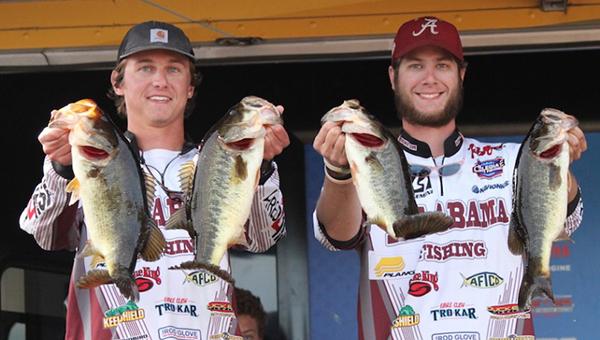The University of Alabama is known for sports like football, gymnastics, softball and basketball, not bass fishing.
While collegiate bass fishing is not an NCAA-sanctioned sport, the UA club team garners national attention and consistently finishes among the best teams in the country.
John Bryant, sophomore fisherman, said he wants to disprove some of the misconceptions about team.
“Most people think of fishing as [just] going and throwing a line out,” he said. “But that’s not what competitive fishing is all about.”
The UA fishing team consists of 26 fishermen. Two teammates must be paired on a boat to compete in a tournament. A pair of teammates could compete in as many as 25 tournaments in a season. Tournaments vary in size, ranging anywhere from 15 to 250 boats in a given competition.
The boat with the five biggest fish wins the tournament, but certain criteria have to be followed in order to win. Points can be deducted for things such as bringing in dead fish and being late for weigh-ins.
UA bass fishing is an official Bass Angler Sportsman Society college team and has been since its inception in 2007. The team has enjoyed routine top-10 finishes since then. Robert Findlay, a professor of biological sciences who serves as the team’s faculty advisor, said much of the team’s success can be attributed to its foundation and location.
“Success breeds success,” he said. “We were founded by really good bass fishermen. Some of it is the fact that we are in Alabama. You could say the center of bass fishing in the world is Alabama.”
One of the team’s cofounders, Hank Weldon, currently serves as the director of Bassmaster College Series.
Freshman fisherman Lee Mattox said studying is a big part of preparing to compete in a tournament.
“Before every tournament, we study Google Earth images of bodies of water,” he said. “We do research on prior tournaments and how they were won in the past.”
Teammates will go to the lake where the tournament will be held about two days beforehand to get a feel for the body of water and fish, Mattox said.
Since bass fishing is considered a club sport, scholarships are not given. Players pay their own way into tournaments. They are also responsible for their own gas, food and sleeping arrangements.
Traveling long distances to compete makes it more difficult to perform at a high level, Bryant said.
“You’re already fishing eight hours a day,” he said. “It makes it harder when you have a couple of hours to drive on top of that.”
Mattox said academics can be a concern when it comes to traveling for tournaments.
“The biggest thing is that all the traveling and competition has you worried about what you are missing in class,” he said. “But at the same time, you are worried about performing well in the tournament.”
Not being able to control every facet of a competition is what sets bass fishing apart from other sports, he said.
“In typical sports, weightlifting and training can prevail you to win,” Mattox said. “In fishing you can have amazing talent, but factors such as weather and wildlife can determine the outcome.”
Findlay said he wants it to be known that the team can be seen competing live in tournaments.
“Depending on the cable subscription, you could see them on TV,” Findlay said. “Depending on the regional, you could watch them weigh in live on the web.”
Team members Keith Kirkley and Frankie Appaluccio will compete in the 2015 FLW College National Championship on April 17-19. Kirkley and Appaluccio qualified for the final after winning the FLW College Fishing SEC Invitational last October.
The team, currently ranked fifth in the nation, won the Forrest L. Wood College Southern Regional last weekend. The victory qualifies the team for the conference championship.









